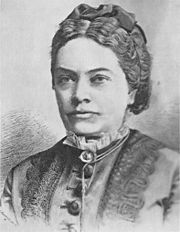
Marie von Ebner-Eschenbach
Encyclopedia

Austria
Austria , officially the Republic of Austria , is a landlocked country of roughly 8.4 million people in Central Europe. It is bordered by the Czech Republic and Germany to the north, Slovakia and Hungary to the east, Slovenia and Italy to the south, and Switzerland and Liechtenstein to the...
n writer
Writer
A writer is a person who produces literature, such as novels, short stories, plays, screenplays, poetry, or other literary art. Skilled writers are able to use language to portray ideas and images....
. Noted for her excellent psychological novel
Psychological novel
A psychological novel, also called psychological realism, is a work of prose fiction which places more than the usual amount of emphasis on interior characterization, and on the motives, circumstances, and internal action which springs from, and develops, external action...
s, she is regarded—together with Ferdinand von Saar
Ferdinand von Saar
Ferdinand Ludwig Adam von Saar was an Austrian novelist, playwright and poet....
—as one of the most important German-language
German language
German is a West Germanic language, related to and classified alongside English and Dutch. With an estimated 90 – 98 million native speakers, German is one of the world's major languages and is the most widely-spoken first language in the European Union....
writers of the latter portion of the 19th century.
She was born at the castle of Dubský (Graf von Třebomyslice) family in Zdislavice
Zdislavice
Zdislavice is a municipality and town in Benešov District in the Central Bohemian Region of the Czech Republic. -References:*This article was initially translated from the Czech Wikipedia....
near Kroměříž
Kromeríž
Kroměříž is a town in the Zlín Region of the Czech Republic. The town's main landmark is the Baroque Kroměříž Bishop's Palace, where some scenes from Amadeus and Immortal Beloved were filmed...
in Moravia
Moravia
Moravia is a historical region in Central Europe in the east of the Czech Republic, and one of the former Czech lands, together with Bohemia and Silesia. It takes its name from the Morava River which rises in the northwest of the region...
, Austrian Empire
Austrian Empire
The Austrian Empire was a modern era successor empire, which was centered on what is today's Austria and which officially lasted from 1804 to 1867. It was followed by the Empire of Austria-Hungary, whose proclamation was a diplomatic move that elevated Hungary's status within the Austrian Empire...
, and died in Vienna
Vienna
Vienna is the capital and largest city of the Republic of Austria and one of the nine states of Austria. Vienna is Austria's primary city, with a population of about 1.723 million , and is by far the largest city in Austria, as well as its cultural, economic, and political centre...
, Austria.
She is credited with the famous aphorism
Aphorism
An aphorism is an original thought, spoken or written in a laconic and memorable form.The term was first used in the Aphorisms of Hippocrates...
"even a stopped clock is right twice a day."
Works
- Aus Franzensbad. 6 Episteln von keinem Propheten. Leipzig: Lorck, 1858
- Maria Stuart in Schottland. Schauspiel in fünf Aufzügen. Wien: Ludwig Mayer, 1860
- Das Veilchen. Lustspiel in einem Aufzug. Wien: Wallishausser, 1861
- Marie Roland. Trauerspiel in 5 Aufzügen. Wien: Wallishausser, 1867
- Doktor Ritter. Dramatisches Gedicht in 1 Aufzug. Wien: Jasper, 1869
- Die Prinzessin von Banalien. Ein Märchen. Wien: Rosner, 1872
- Das Waldfräulein, 1873
- Božena. Erzählung. Stuttgart: Cotta, 1876
- Die Freiherren von Gemperlein, 1878
- Lotti, die Uhrmacherin, in: "Deutsche Rundschau", 1880
- Aphorismen. Berlin: Franz Ebhardt, 1880
- Dorf- und Schloßgeschichten (Erzählungen), 1883 (darin Der Kreisphysikus, Jacob Szela, Krambambuli, Die Resel, Die Poesie des Unbewußten)
- Zwei Comtessen (Erzählung). Berlin: Franz Ebhardt, 1885
- Neue Dorf- und Schloßgeschichten (Erzählungen). Berlin: Paetel, 1886 (darin Die Unverstandene auf dem Dorfe, Er laßt die Hand küssen, Der gute Mond)
- Das Gemeindekind, (Roman) 1887
- Unsühnbar. Erzählung. Berlin: Paetel, 1890
- Drei Novellen. 1892 (darin Oversberg)
- Glaubenslos? Erzählung. Berlin: Paetel, 1893
- Das Schädliche. Die Totenwacht. Zwei Erzählungen. Berlin: Paetel, 1894
- Rittmeister Brand. Bertram Vogelweid. Zwei Erzählungen. Berlin: Paetel, 1896
- Alte Schule (Erzählungen). Berlin: Paetel, 1897 (darin Ein Verbot, Der Fink, Eine Vision, Schattenleben, Verschollen)
- Am Ende. Szene in 1 Aufzug. Berlin: Bloch, 1897
- Aus Spätherbsttagen. Erzählungen. Berlin: Paetel, 1901 (darin Der Vorzugsschüler, Maslans Frau, Fräulein Susannens Weihnachtsabend, Uneröffnet zu verbrennen, Die Reisegefährten, Die Spitzin, In letzter Stunde, Ein Original, Die Visite)
- Agave (Roman). Berlin: Paetel, 1903
- Die unbesiegbare Macht. Zwei Erzählungen. Berlin: Paetel, 1905
- Meine Kinderjahre. Biographische Skizzen. Berlin: Paetel, 1906
- Altweibersommer. Berlin: Paetel, 1909

